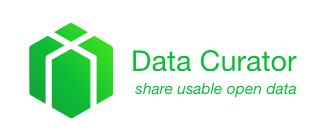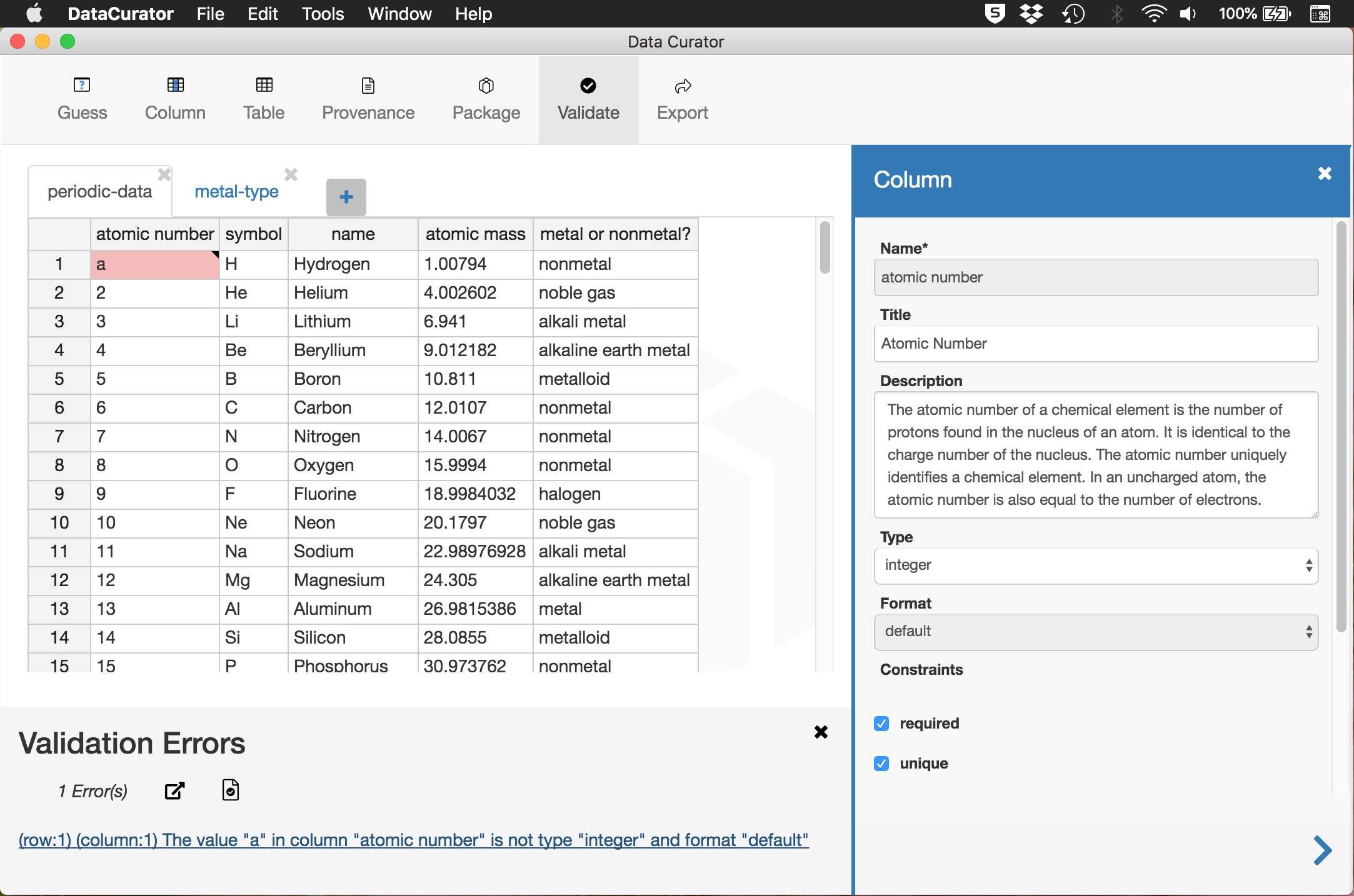qcif / Data Curator
Projects that are alternatives of or similar to Data Curator
✨ Download Data Curator for Windows or macOS. ✨ Request a new feature 💡 Report a bug 🐞 View our plans 🚀 Now available through the Microsoft Windows Store. 🏬
Data Curator
Data Curator is a simple desktop data editor to help describe, validate and share usable open data.
Why do we need Data Curator?
Open data creators are increasingly focusing on improving open data publishing so that data can be used to create insight and drive positive change.
Open data is more likely to be used if data consumers can:
- understand why and how the data was collected
- understand the structure of the data
- look up the meaning of codes used in the data
- understand the quality of the data
- access the data in an open machine-readable format
- know how the data is licensed and how it can be reused
Features
Using Data Curator open data producers can:
- create and edit tabular data from scratch or from a template
- open data from a comma, semi-colon, or tab separated file, or Microsoft Excel file
- open multiple related data tables from a Data Package
- automatically correct common problems found in CSV and Excel files
Using data from any of these sources, you can:
- automatically create a schema that describes the data fields
- refine the schema to include extra data validation rules
- validate the data against the schema
- describe the provenance of your data
- save data as a valid separated value file in various CSV dialects (e.g. comma, semi-colon, or tab separated files)
Once the data is described and validated, you can share the data and its description by exporting a Data Package to:
- publish the data on a CKAN open data portal
- use it as a template for others to make similar data
Open data consumers can use published Data Packages to:
- view the data structure and provenance information to help determine if the data is fit for their purpose
- download the data together with its metadata in a single zip file
- use a suite of tools to work with the data
Follow our progress
Interested in this project? Subscribe to Data Curator News to get occasional updates on our progress and hear about each release. Find help.
Contributions
We welcome all types of contributions to Data Curator:
We acknowledge the great work of others. We are:
- inspired by the ODI Comma Chameleon experiment.
- using the Open Knowledge International Frictionless Data specification and code libraries
- adopting W3C Data on the Web Best Practices
Data Curator proudly uses open source software, including:
| software | organisation | licence | support |
|---|---|---|---|
| Comma Chameleon | The Open Data Institute | MIT | join |
| datapackage.js | Open Knowledge | MIT | donate |
| tableschema-js | Open Knowledge | MIT | donate |
| Electron | GitHub | MIT | contribute |
| Node.js | Node.js | licence | contribute |
| Chromium | The Chromium Authors | licence | contribute |
| Vue.js | Yuxi (Evan) You | MIT | donate |
| electron-vue | SimulatedGREG (Greg Holguin) | MIT | contribute |
| Handsontable | Handsontable | MIT | buy pro |
| Cucumber.js | Cucumber.io | MIT | contribute |
Download and Install Data Curator
- Data Curator is now available through the Microsoft Windows store. Go to the Windows store website and search for "Data Curator".
- Alternatively, choose a platform from the Releases page and download an unsigned release.
- Drag the application to your 'Start Menu' or 'Applications folder.
Development
We develop against the 'develop' branch. The 'master' branch contains tagged releases. We are currently using this branching model by Vincent Driessen.
Requirements
node
yarn
electron
You can use yarn to install all relevant packages and development dependencies. (Install yarn)
We're keeping our dependencies up to date with Dependabot.
Running the application locally
To open the app on your local machine and run Data Curator in development mode:
- change to your local Data Curator directory
-
yarn(pulls down all dependencies) yarn run dev
Data Curator will launch with an extra Developer menu.
Application Architecture
Data Curator is built using Electron, a framework that allows developers to build desktop applications using web technology.
There are two parts of the application, the main process and the renderer process. The main process deals with things like carrying out file operations, validating CSVs, and rendering views. The renderer acts very much like client side javascript in a web browser, dealing with things like presentation, and user interactions.
IPC messaging
Electron passes and listens for messages between main and renderer using the IPC module, one for the main process and one for the renderer process.
Coding Standards
We have adopted Standard JS as our JavaScript coding standard.
We have adopted Recommended Vue as our Vue coding standard.
Tests
Acceptance tests
Acceptance tests for Data Curator are:
-
written using the Gherkin language (learn more) and stored on GitHub
-
shared using the Cucumber Pro beta.
-
arranged in folders like the application menu structure
-
integrated with:
-
Spectron, a purpose built Electron testing framework
-
Cucumber-js, a tool for running automated tests written in plain language for JavaScript
-
reporting tools:
- nyc, a tool for javascript test coverage
- Cucumber-html-reporter, generates Cucumber HTML reports with pie charts
-
other common testing tools, such as
-
Acceptance tests are automatically added to Cucumber Pro via a GitHub webhook.
Unit tests
For unit testing, we use:
- Karma, a browser test runner, designed for low-level/unit testing. Currently we use this for testing code running in electron's 'renderer' process.
- Mocha
- Chai
- Sinon
- Mocha-webpack, a mocha test runner with integrated webpack precompiler. Currently we use this for testing code running in electron's 'main' process.
Continuous integration
For continuous integration, we use:
We plan to integrate the acceptance and unit tests with code commits
To run unit tests and implemented acceptance tests:
yarn run test
Deployment
Building a new package
To build Data Curator locally:
yarn run build
To automate deployment, we are using:
To trigger the automated build and draft release, create and push a git tag, following the versioning pattern used in current releases. Ensure that any changes in this tag are also released back to develop and master branches.
Changes are recorded on the Releases page.










